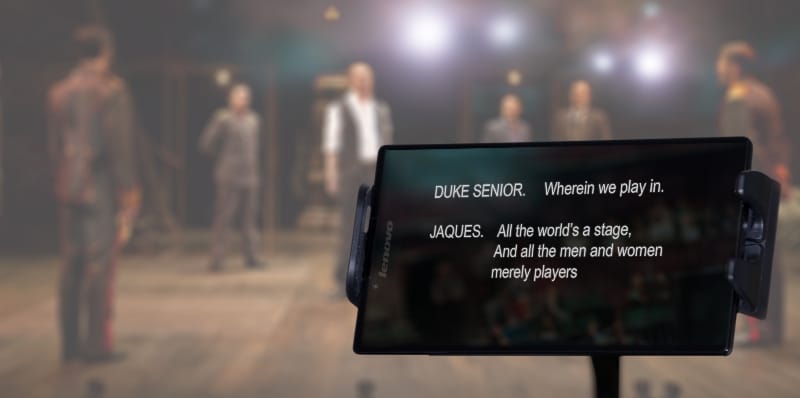DCPA NEWS CENTER
Enjoy the best stories and perspectives from the theatre world today.
Enjoy the best stories and perspectives from the theatre world today.

A demonstration of the DCPA Theatre Company’s improved personal closed-captioning devices.
As the DCPA Theatre Company opens its 40th anniversary season this month, it is expanding services for patrons who are deaf or have hearing loss.
Personal closed-captioning devices are being made available for four plays this season: Oklahoma!, A Christmas Carol, Anna Karenina and Sweat. That’s double the number of productions from last season.
A personal closed-captioning device is a portable hand-held tablet that is configured with closed-captioning software, enabling users to enjoy private captioning services in any seating location. The devices will be available at the performances listed below, and may be checked out with a photo ID at the Patron Services desk in the lobby (subject to availability):
Personal closed-captioning devices are popular with the deaf and hearing-loss communities, and are especially useful to patrons whose hearing is declining, said Theatre Services Manager Carol Krueger. “Captioning is an easy way for folks who have lost some of their hearing to remain active in the arts,” Krueger said.

Personal closed-captioning devices will be available at all performances of ‘Oklahoma!’ starting Sept. 18. Rehearsal photo by John Moore.
Personal closed-captioning devices are just one way the Denver Center services audiences who are deaf or have hearing loss. The Theatre Company makes both Braille and large-print print programs available for all shows. And one “0pen-captioning performance” — where live captioning is digitally projected onto a screen near the stage — will be designated for every Broadway run, as well as one Theatre Company performance (Oklahoma! on Sept. 30).
The Denver Center also makes “assistive listening devices” available for all performances. Those are headsets that amplify the sound from the stage for patrons who have hearing loss. But assistive listening devices are limited in their usefulness depending on the state of the patron’s hearing.
The response from audiences to the Denver Center’s enhanced services “has been amazing,” said Kirk Petersen, the Denver Center’s Associate Director of Ticket Services. “We have a small army of patrons who have been very gung-ho in encouraging us to move ahead with these personal-captioning devices.”
The first iteration of the personal closed-captioning system was a trial during the Theatre Company’s 2015 production of Tribes, which featured characters and actors who are deaf or have hearing loss. From this original trial, the personal closed-captioning system has expanded to include 15 devices available for patrons’ usage.
The devices, Krueger added, are controlled by a live staff person who advances the system in real time, as opposed to using a pre-recorded version. That allows the operator to carefully time the delivery of the words exactly as they are spoken. “Every performance is different,” Krueger said. “Things change, and there are times when the words don’t always match up with the script. Having a live operator also ensures that the captions don’t come up too fast and possibly spoil a punchline before it gets delivered.”
Petersen said as services continue to expand, audiences will have the option of requesting captions in dual languages.
John Moore was named one of the 12 most influential theater critics in the U.S by American Theatre Magazine in 2011. He has since taken a groundbreaking position as the Denver Center’s Senior Arts Journalist.
 Oklahoma! Ticket information
Oklahoma! Ticket information